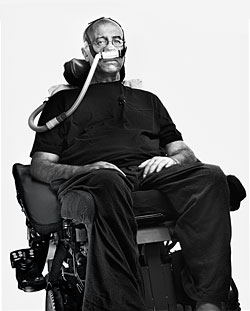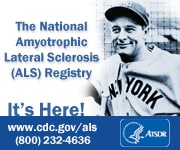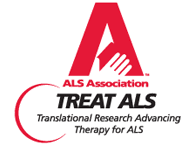Regardless of what they call this disease in your part of the world, please take a moment on the first weekend of May and pray in your own way for those dealing with ALS.
For your consideration...www.wehaveaprayer.org
Monday, March 22, 2010
Sunday, March 21, 2010
We Learned Something Today From Another "A" DIsease

This morning there was a letter to the editor in my local paper from a national board member of the Alzheimer's Association. The letter was emphasizing the need for added federal funding for research (sound familiar?). The seal-the-deal line was that for every dollar the federal government spends on Alzheimer's research, it spends $2.50 on patient care.
I turned the page with two thoughts --
- The federal research::care ratio makes a compelling case for increasing research spending, and I'm sure that ALS has a ratio that is even more lopsided than Alzheimer's.
- Organizations need leaders who are ready, able, and willing to write letters to editors and keep their causes in front of the public. Board and executive staffs are full of talented and eloquent people. Please speak up!
Labels:
ALS Advocate,
ALS Funding
Wednesday, March 17, 2010
What is an Advocate? by Doug Eshleman - 2000
In memory of Douglas Edwin Eshleman, who lost his battle with ALS on
Nov. 28, 2001, he was only 43.
According to The American Heritage Dictionary, an advocate is one who:
· Speaks in favor of or recommends something
· Argues for a cause
· Is a supporter or defender
· Pleads in another's behalf
To be successful, the advocate must dedicate work to some or all of the following areas:
· Raising awareness
· Raising money
· Applying political pressure
· Recruiting more advocates
Every group whose members are brought together for a common cause has its advocates. In the work force, worker advocacy groups are labor unions, which wield considerable power due to the solidarity of the workers. The unions have the power to shut down production and bring work to a standstill. Labor unions are formed through the efforts of advocates who desire better working conditions for the employees.
Other groups who share common goals and desires have their advocates as well. The group may be bound together by age such as AARP, by issues such as Greenpeace, and by disease such as people with AIDS. The more advocates a group has and the more effort put forth by the advocates, the more successful the group will be in accomplishing its goals.
All of us with ALS are members of the union of PALS (People with ALS). We are united by disease and we have the common goal of finding a cure. We are no different from other advocacy groups although there are two factors which make our job of raising awareness and applying political pressure more difficult. First, we are a relatively small group. It is estimated there are only 30,000 PALS alive in the U.S. at any one time. Even if everyone of those 30,000 were hard working ALS advocates, we still would not have the clout that other disease groups have. AIDS and cancer advocates number in the millions. Second, the members of our union of PALS become weak so quickly and die so soon that little time or energy is left to be advocates. Half of all PALS die within 18 months of diagnosis.
Yet, even with these grim statistics, many PALS and their friends and loved ones press on determined to have their voices heard. Our lives are on the line and many of us become involved in advocacy because we realize if we do not fight for our cause no one else will. The old saying "The squeaking wheel gets the grease" rings true. We know that we my not have the loudest voice but we want to make sure we have a voice that will be heard.
How can PALS and their supporters be advocates? The great thing about advocacy is that a small effort can have large results. My friend, Janis, who is typing this for me, is a good example. Last year during ALS Awareness month in May, she wore the ALS ribbon on her blouse for the entire month. This took very little effort on her part, but she raised awareness about the disease. At least 10 of her co-workers asked her about the ribbon and there were probably others who heard through the grapevine what the ribbon was for.
ALS advocacy can be done through both group and individual efforts. Large national organizations which help PALS such as the MDA and the ALS Association draw strength from the efforts of PALS supporters who volunteer their time and money. Local ALSA chapters are composed almost entirely of volunteers who are advocates for the cause. It is easy for PALS and their families to become members of these groups. There is strength in numbers and the more PALS who are involved the more our message will be heard.
In the past 2 or 3 years numerous new ALS advocacy groups have sprung up with the goal of raising money for research. Project ALS is an organization run by three sisters, one of whom has ALS. Through their contacts in the entertainment industry, they have raised over $1.5 million dollars. Two other groups, Hope For ALS and ALS Therapy Development Foundation, were begun by PALS and their families who were frustrated at the slow pace of conventional research. Money raised by these groups is already going to fast track research projects unencumbered by bureaucratic red tape.
Other PALS created groups such as ALS March of Faces are continually bringing forth new innovative projects to raise money and awareness. ALS March of Faces has helped raise over $1 million dollars and educated countless persons from creative efforts such as selling ALS awareness ribbons and organizing a cross-country bus tour.
All of these groups need money and volunteers. Everyone who gets ALS is told by well-meaning friends, "If there is anything I can do..." Tell them there is much they can do, beginning with donating time and/or money to one of the ALS advocacy groups. The names and addresses are listed below. Contact one of them to learn how you can make a difference. If every PALS family makes a concerted effort at ALS advocacy, we will soon have the resources to develop research to find a cure.
The ALS Association
27001 Agoura Road, Suite 150, Calabasas Hills, CA 91301-5104
Phone: 888-949-2577, Website: http://www.alsa.org/
Muscular Dystrophy Association
P.O. Box 78342, Phoenix, AZ 85062-8342
Phone: 800-344-4863, Website: http://www.mdausa.org/
ALS Therapy Development Foundation
218 Mill Street, Newton, Massachusetts 02460
Phone: (617)796-8826, Website: http://www.als-tdf.org/
Hope for ALS
7822 Santa Elena, Suite 100, Houston, TX 77061
Phone: 713-643-2898, Website: http://www.hopeforals.com/
The ALS Survival Guide
http://www.alssurvivalguide.com
A web site about ALS by Doug Eshleman
Nov. 28, 2001, he was only 43.
According to The American Heritage Dictionary, an advocate is one who:
· Speaks in favor of or recommends something
· Argues for a cause
· Is a supporter or defender
· Pleads in another's behalf
To be successful, the advocate must dedicate work to some or all of the following areas:
· Raising awareness
· Raising money
· Applying political pressure
· Recruiting more advocates
Every group whose members are brought together for a common cause has its advocates. In the work force, worker advocacy groups are labor unions, which wield considerable power due to the solidarity of the workers. The unions have the power to shut down production and bring work to a standstill. Labor unions are formed through the efforts of advocates who desire better working conditions for the employees.
Other groups who share common goals and desires have their advocates as well. The group may be bound together by age such as AARP, by issues such as Greenpeace, and by disease such as people with AIDS. The more advocates a group has and the more effort put forth by the advocates, the more successful the group will be in accomplishing its goals.
All of us with ALS are members of the union of PALS (People with ALS). We are united by disease and we have the common goal of finding a cure. We are no different from other advocacy groups although there are two factors which make our job of raising awareness and applying political pressure more difficult. First, we are a relatively small group. It is estimated there are only 30,000 PALS alive in the U.S. at any one time. Even if everyone of those 30,000 were hard working ALS advocates, we still would not have the clout that other disease groups have. AIDS and cancer advocates number in the millions. Second, the members of our union of PALS become weak so quickly and die so soon that little time or energy is left to be advocates. Half of all PALS die within 18 months of diagnosis.
Yet, even with these grim statistics, many PALS and their friends and loved ones press on determined to have their voices heard. Our lives are on the line and many of us become involved in advocacy because we realize if we do not fight for our cause no one else will. The old saying "The squeaking wheel gets the grease" rings true. We know that we my not have the loudest voice but we want to make sure we have a voice that will be heard.
How can PALS and their supporters be advocates? The great thing about advocacy is that a small effort can have large results. My friend, Janis, who is typing this for me, is a good example. Last year during ALS Awareness month in May, she wore the ALS ribbon on her blouse for the entire month. This took very little effort on her part, but she raised awareness about the disease. At least 10 of her co-workers asked her about the ribbon and there were probably others who heard through the grapevine what the ribbon was for.
ALS advocacy can be done through both group and individual efforts. Large national organizations which help PALS such as the MDA and the ALS Association draw strength from the efforts of PALS supporters who volunteer their time and money. Local ALSA chapters are composed almost entirely of volunteers who are advocates for the cause. It is easy for PALS and their families to become members of these groups. There is strength in numbers and the more PALS who are involved the more our message will be heard.
In the past 2 or 3 years numerous new ALS advocacy groups have sprung up with the goal of raising money for research. Project ALS is an organization run by three sisters, one of whom has ALS. Through their contacts in the entertainment industry, they have raised over $1.5 million dollars. Two other groups, Hope For ALS and ALS Therapy Development Foundation, were begun by PALS and their families who were frustrated at the slow pace of conventional research. Money raised by these groups is already going to fast track research projects unencumbered by bureaucratic red tape.
Other PALS created groups such as ALS March of Faces are continually bringing forth new innovative projects to raise money and awareness. ALS March of Faces has helped raise over $1 million dollars and educated countless persons from creative efforts such as selling ALS awareness ribbons and organizing a cross-country bus tour.
All of these groups need money and volunteers. Everyone who gets ALS is told by well-meaning friends, "If there is anything I can do..." Tell them there is much they can do, beginning with donating time and/or money to one of the ALS advocacy groups. The names and addresses are listed below. Contact one of them to learn how you can make a difference. If every PALS family makes a concerted effort at ALS advocacy, we will soon have the resources to develop research to find a cure.
The ALS Association
27001 Agoura Road, Suite 150, Calabasas Hills, CA 91301-5104
Phone: 888-949-2577, Website: http://www.alsa.org/
Muscular Dystrophy Association
P.O. Box 78342, Phoenix, AZ 85062-8342
Phone: 800-344-4863, Website: http://www.mdausa.org/
ALS Therapy Development Foundation
218 Mill Street, Newton, Massachusetts 02460
Phone: (617)796-8826, Website: http://www.als-tdf.org/
Hope for ALS
7822 Santa Elena, Suite 100, Houston, TX 77061
Phone: 713-643-2898, Website: http://www.hopeforals.com/
The ALS Survival Guide
http://www.alssurvivalguide.com
A web site about ALS by Doug Eshleman
Wednesday, March 10, 2010
We Need To See The Rest Of The Stories
 MDA has a series of patients vignettes in May titled, "Anyone's Life Story." ALSA has a flatteringly similar series titled, "ALS Across America." Each profiles many brave people with ALS throughout the month of May (ALS Awareness Month in the U.S.).
MDA has a series of patients vignettes in May titled, "Anyone's Life Story." ALSA has a flatteringly similar series titled, "ALS Across America." Each profiles many brave people with ALS throughout the month of May (ALS Awareness Month in the U.S.). Showing a new set of patients every May doesn't tell the ALS story well enough. We need a "where are they now" follow-up of past honorees to help the world understand ALS. Some have died. Many are still hanging in there, but ALS is a different, more difficult beast to deal with as time goes on. A glimpse of the physical changes that honorees endure in a year would be startling to a public that is very naive about ALS. It would also continue to honor the past honorees.
There are handsome family pictures when PALS are honored. It wouldn't be pretty, but it would be very enlightening to show family pictures in a year or two or three.
Will an organization seize this opportunity distinguish this disease and tell the rest of the stories?
Labels:
ALS,
ALS Awareness
Tuesday, March 9, 2010
Tony Judt may have ALS, But...............

Thought readers of ALS Spread the Word would find this New York magazine feature interesting-
Since being diagnosed with ALS, historian Tony Judt has worked on three books, re-sparked old feuds, and, as writer Wesley Yang explains in this week’s New York, cemented his reputation as the city’s most spirited public intellectual, paralysis be damned:
The essay was unlike anything he had written before: an intimate view of the author’s private anguish. “I can’t remember another piece of memoiristic writing that created such waves of interest in our little pond,” says the writer and Columbia professor Todd Gitlin. It was not, however, the whole of his written output. After spending a few months absorbing the shock of his diagnosis eighteen months ago, Judt has become enormously prolific: dictating essays and opinion pieces, delivering a public lecture to a packed auditorium, and assembling material for three books, one of which—a rallying cry on behalf of a renewed social democracy—will be published next week. Consigned to a broken body but perfectly sound in mind, he has acquired something of a second presence beyond that of a historian and public intellectual—a figure whose pathos haunts the thoughts of others. “There are many days now where I find myself thinking about Tony Judt,” says Gitlin, “and I hardly even know him.”
Read on: http://nymag.com/news/features/64626/
Thanks,
Jill Weiskopf
Public Relations Manager
New York Media
212-508-0656
Since being diagnosed with ALS, historian Tony Judt has worked on three books, re-sparked old feuds, and, as writer Wesley Yang explains in this week’s New York, cemented his reputation as the city’s most spirited public intellectual, paralysis be damned:
The essay was unlike anything he had written before: an intimate view of the author’s private anguish. “I can’t remember another piece of memoiristic writing that created such waves of interest in our little pond,” says the writer and Columbia professor Todd Gitlin. It was not, however, the whole of his written output. After spending a few months absorbing the shock of his diagnosis eighteen months ago, Judt has become enormously prolific: dictating essays and opinion pieces, delivering a public lecture to a packed auditorium, and assembling material for three books, one of which—a rallying cry on behalf of a renewed social democracy—will be published next week. Consigned to a broken body but perfectly sound in mind, he has acquired something of a second presence beyond that of a historian and public intellectual—a figure whose pathos haunts the thoughts of others. “There are many days now where I find myself thinking about Tony Judt,” says Gitlin, “and I hardly even know him.”
Read on: http://nymag.com/news/features/64626/
Thanks,
Jill Weiskopf
Public Relations Manager
New York Media
212-508-0656
Subscribe to:
Comments (Atom)









